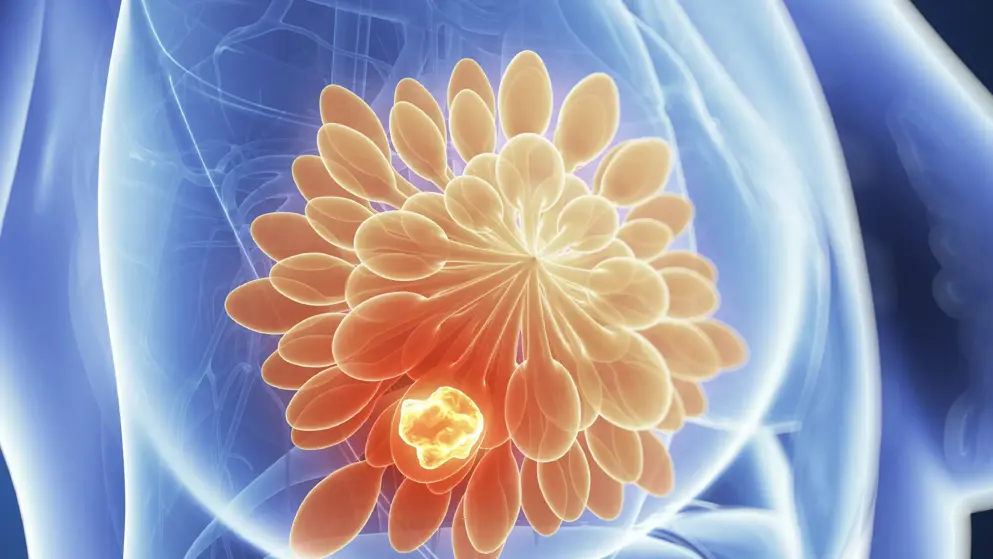
FDA approves Kisqali (ribociclib + an aromatase inhibitor) to reduce risk of recurrence in people with HR+/HER2- early breast cancer
Novartis announced that the FDA has approved Kisqali (ribociclib) in combination with an aromatase inhibitor (AI) for the adjuvant treatment of people with hormone receptor-positive/human epidermal growth factor receptor 2-negative (HR+/HER2-) stage II and III early breast cancer (EBC) at high risk of recurrence, including those with node-negative (N0) disease
The approval is based on results from the pivotal Phase III NATALEE trial, which showed a significant and clinically meaningful 25.1% (HR=0.749; 95% CI: 0.628, 0.892; P=0.0006) reduction in risk of disease recurrence in a broad population of patients with HR+/HER2- stage II and III EBC treated with adjuvant Kisqali plus endocrine therapy (ET) compared to ET alone, including those with high-risk N0 disease. The invasive disease-free survival (iDFS) benefit was consistently observed across all patient subgroups." The FDA approval of Kisqali for this early breast cancer population, including those with N0 disease, is a pivotal moment in improving our approach to care,” said Dennis J. Slamon, M.D., Director of Clinical/Translational Research, UCLA Jonsson Comprehensive Cancer Center and Chairman of the Board of Translational Research In Oncology (TRIO) and NATALEE trial lead investigator. “Today’s approval allows us to offer treatment with a CDK4/6 inhibitor to a significantly broader group of people as a powerful tool that, combined with endocrine therapy, can help further minimize their risk of cancer returning.”
In EBC, Kisqali is taken with or without food as a once-daily oral dose of 400 mg (two 200 mg tablets) for three weeks, followed by one week off treatment, in combination with four weeks of any AI. Patients should take Kisqali for three years. The NATALEE trial showed the safety profile of Kisqali at the 400 mg dose was well tolerated, with discontinuations mainly driven by asymptomatic laboratory findings. Adverse events (AEs) of special interest in the Kisqali + ET arm of the NATALEE trial include (all Grades, and Grades 3/4, respectively): neutropenia (62.5%, 44.3%), liver-related AEs (26.4%, 8.6%), QT interval prolongation (5.3%, 1.0%), and interstitial lung disease/pneumonitis (1.5%, 0.0%).
An updated analysis from the NATALEE trial recently presented at the European Society for Medical Oncology (ESMO) Congress 2024 reinforces the data analyzed by the FDA. Results showed a deepening benefit beyond the three-year treatment period and reduced the risk of recurrence by 28.5% (HR=0.715; CI 95% 0.609–0.840; P<0.0001), compared to ET alone, in patients with stage II and III HR+/HER2- EBC. Novartis will continue evaluating NATALEE patients for longer-term outcomes, including overall survival.
Raising the bar for EBC survivors; Approximately 90% of breast cancer cases in the US are diagnosed early (stages I-III) and treated promptly with curative intent – sometimes with adjuvant ET. In spite of this, people with stage II and III HR+/HER2- EBC remain at risk of cancer coming back – in most cases, as incurable metastatic disease. Recurrence remains a lifelong concern, though most tumors return within the first years, even in cases with no lymph node involvement. Despite ET, 10% of people with high-risk N0 disease may face recurrence within the first three years after diagnosis.
"With this approval, we are redefining treatment options for a broader population of people impacted by breast cancer and facing the persistent risk of recurrence,” said Victor Bultó, President, US, Novartis. “We continue to transform cancer care with Kisqali, building on its established profile in the metastatic setting and now helping a wide range of people as they strive to stay cancer-free following an early-stage diagnosis.”

